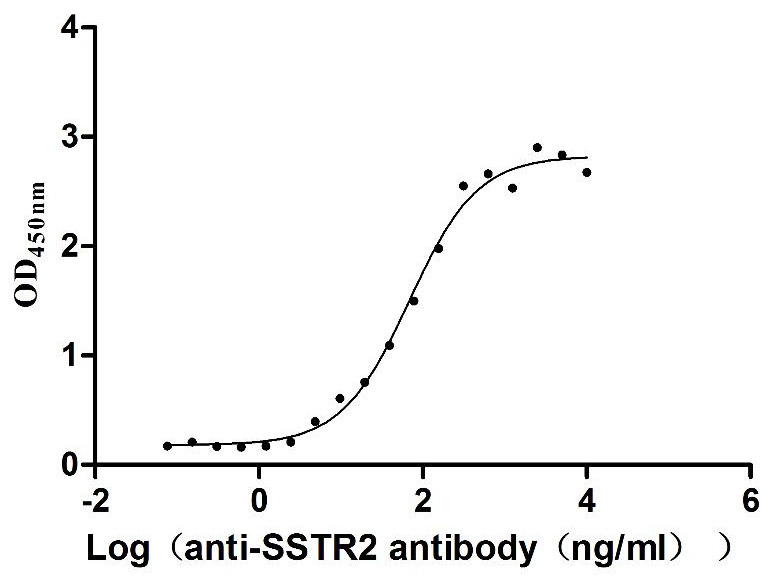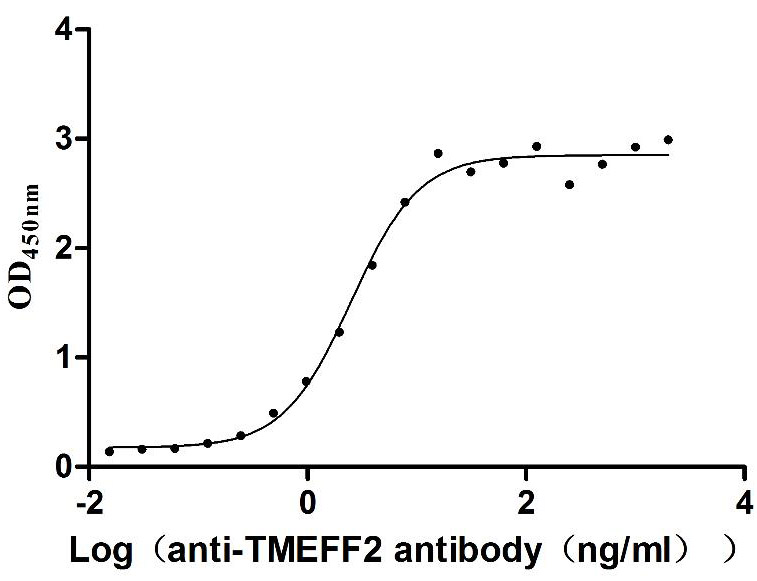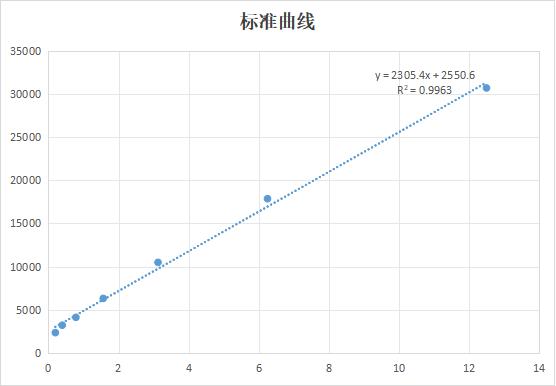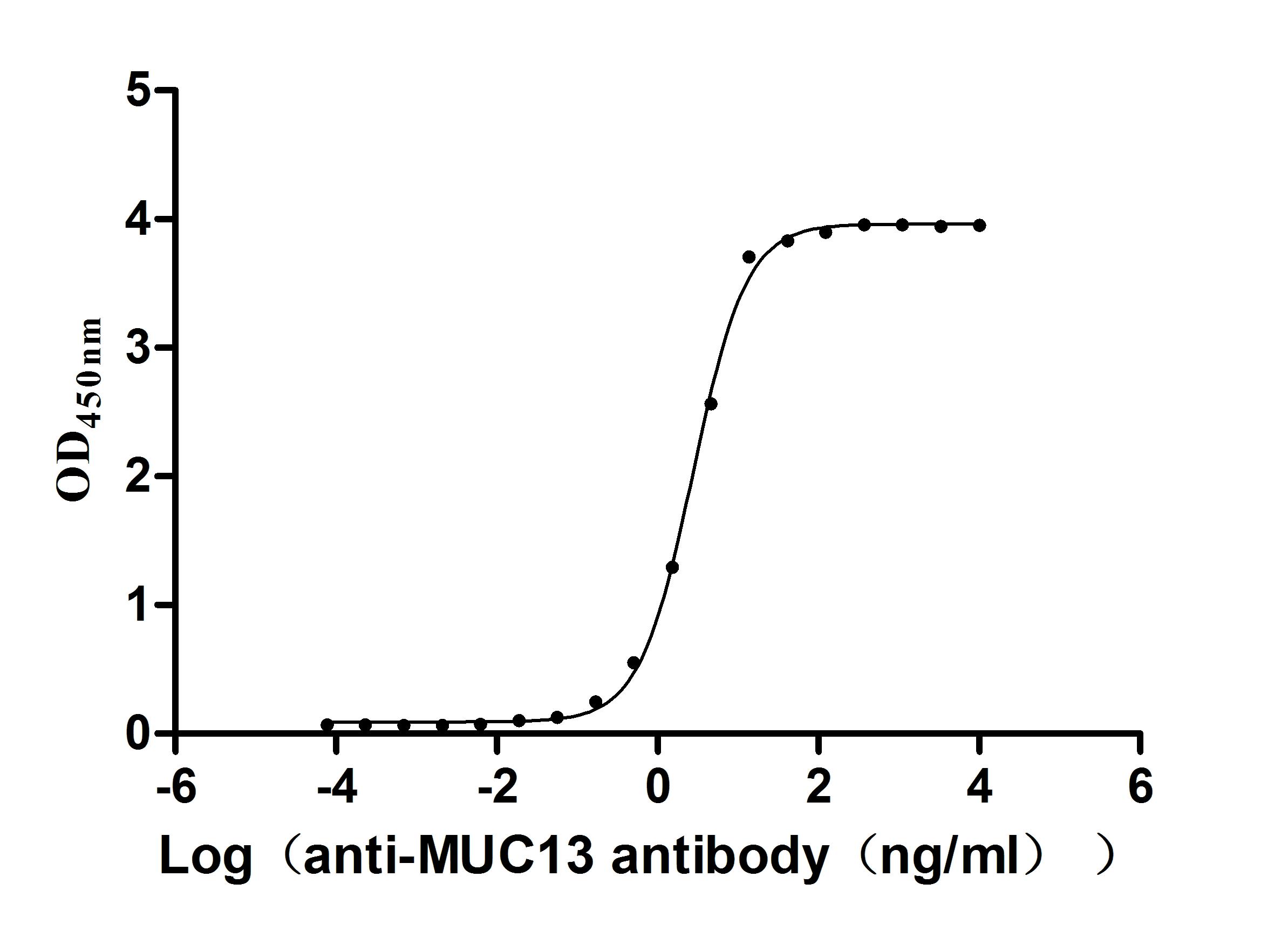Recombinant Human Elongation factor 1-alpha 1 (EEF1A1)
-
货号:CSB-YP007409HU
-
规格:
-
来源:Yeast
-
其他:
-
货号:CSB-EP007409HU-B
-
规格:
-
来源:E.coli
-
共轭:Avi-tag Biotinylated
E. coli biotin ligase (BirA) is highly specific in covalently attaching biotin to the 15 amino acid AviTag peptide. This recombinant protein was biotinylated in vivo by AviTag-BirA technology, which method is BriA catalyzes amide linkage between the biotin and the specific lysine of the AviTag.
-
其他:
-
货号:CSB-BP007409HU
-
规格:
-
来源:Baculovirus
-
其他:
-
货号:CSB-MP007409HU
-
规格:
-
来源:Mammalian cell
-
其他:
产品详情
-
纯度:Greater than 90% as determined by SDS-PAGE.
-
基因名:
-
Uniprot No.:
-
别名:CCS 3; CCS3; Cervical cancer suppressor 3; chunp6927; CTCL tumor antigen; EE1A1; EEF 1; EEF1A; eEF1A-1; EEF1A1; EF-1-alpha-1; EF-Tu; EF1A; EF1a like protein; EF1A1_HUMAN; Elongation factor 1 alpha subunit; Elongation factor 1-alpha 1; Elongation factor Tu; Eukaryotic elongation factor 1 A-1; Eukaryotic translation elongation factor 1 alpha 1; Eukaryotic translation elongation factor 1 alpha 1 like 14; Glucocorticoid receptor AF 1 specific elongation factor; GRAF 1EF; HNGC:16303; ik:tdsubc_2a3; ik:tdsubc_2b3; LENG7; Leukocyte receptor cluster (LRC) member 7; Leukocyte receptor cluster member 7; Prostate tumor inducing protein 1; PTI1; tdsubc_2a3; Translation elongation factor 1 alpha 1 like 14; wu:fa91c07; wu:fa94b03; wu:fi13b09; xx:tdsubc_2a3; xx:tdsubc_2b3
-
种属:Homo sapiens (Human)
-
蛋白长度:Full Length
-
分子量:52.1kDa
-
表达区域:1-462aa
-
氨基酸序列MGKEKTHINIVVIGHVDSGKSTTTGHLIYKCGGIDKRTIEKFEKEAAEMGKGSFKYAWVLDKLKAERERGITIDISLWKFETSKYYVTIIDAPGHRDFIKNMITGTSQADCAVLIVAAGVGEFEAGISKNGQTREHALLAYTLGVKQLIVGVNKMDSTEPPYSQKRYEEIVKEVSTYIKKIGYNPDTVAFVPISGWNGDNMLEPSANMPWFKGWKVTRKDGNASGTTLLEALDCILPPTRPTDKPLRLPLQDVYKIGGIGTVPVGRVETGVLKPGMVVTFAPVNVTTEVKSVEMHHEALSEALPGDNVGFNVKNVSVKDVRRGNVAGDSKNDPPMEAAGFTAQVIILNHPGQISAGYAPVLDCHTAHIACKFAELKEKIDRRSGKKLEDGPKFLKSGDAAIVDMVPGKPMCVESFSDYPPLGRFAVRDMRQTVAVGVIKAVDKKAAGAGKVTKSAQKAQKAK
-
蛋白标签:Tag type will be determined during the manufacturing process.
The tag type will be determined during production process. If you have specified tag type, please tell us and we will develop the specified tag preferentially. -
产品提供形式:Lyophilized powder
Note: We will preferentially ship the format that we have in stock, however, if you have any special requirement for the format, please remark your requirement when placing the order, we will prepare according to your demand. -
复溶:We recommend that this vial be briefly centrifuged prior to opening to bring the contents to the bottom. Please reconstitute protein in deionized sterile water to a concentration of 0.1-1.0 mg/mL.We recommend to add 5-50% of glycerol (final concentration) and aliquot for long-term storage at -20℃/-80℃. Our default final concentration of glycerol is 50%. Customers could use it as reference.
-
储存条件:Store at -20°C/-80°C upon receipt, aliquoting is necessary for mutiple use. Avoid repeated freeze-thaw cycles.
-
保质期:The shelf life is related to many factors, storage state, buffer ingredients, storage temperature and the stability of the protein itself.
Generally, the shelf life of liquid form is 6 months at -20°C/-80°C. The shelf life of lyophilized form is 12 months at -20°C/-80°C. -
货期:Delivery time may differ from different purchasing way or location, please kindly consult your local distributors for specific delivery time.Note: All of our proteins are default shipped with normal blue ice packs, if you request to ship with dry ice, please communicate with us in advance and extra fees will be charged.
-
注意事项:Repeated freezing and thawing is not recommended. Store working aliquots at 4°C for up to one week.
-
Datasheet :Please contact us to get it.
相关产品
靶点详情
-
功能:This protein promotes the GTP-dependent binding of aminoacyl-tRNA to the A-site of ribosomes during protein biosynthesis. Plays a role in the positive regulation of IFNG transcription in T-helper 1 cells as part of an IFNG promoter-binding complex with TXK and PARP1.; (Microbial infection) Required for the translation of viral proteins and viral replication during human coronavirus SARS-CoV-2 infection.
-
基因功能参考文献:
- The functional studies of specific methylation sites found them to have distinct effects, notably on Eukaryotic elongation factor 1A (eEF1A)-related processes of translation and tRNA aminoacylation. PMID: 29398204
- A strong correlation was found between the dysregulation of eEF1A synthesis and Alzheimer's Disease-associated synaptic failure. PMID: 27567813
- the different kinases that recognize the Ser and Thr residues of the eEF1A1 and eEF1A2 isoforms and regulate their involvement in different cellular processes like cell survival and apoptosis. PMID: 27568183
- Taken together, these findings enabled us to identify a novel mechanism by which eEF1A1 regulates the cell cycle's G1 phase to promote tumor proliferation by regulating cyclin D1 expression through STAT1 signaling in HCC. PMID: 29079187
- Methylation of lysine (K36) in eukaryotic elongation factor alpha (eEF1A) proteins is dependent on EEF1A lysine methyltransferase 4 (eEF1A-KMT4) in vivo. PMID: 28520920
- The present study identifies METTL21B as the enzyme responsible for methylation of eEF1A on Lys-165 and shows that this modification is dynamic, inducible and likely of regulatory importance. PMID: 28108655
- EEF1A1 is somatically mutated in 9% of follicular lymphoma tumors. PMID: 25713363
- we show how FAT10 stabilizes the translation elongation factor eEF1A1, which contributes to cancer cell proliferation PMID: 27312528
- The expression of RPL13A and EEF1A1 was not affected by differentiation, thus being these genes the most stable candidates as reference genes for RT-PCR. PMID: 27304673
- Study demonstrated that PAK4 interacted with eEF1A1 to promote migration and invasion of gastric cancer cells, thereby providing new insights into the function of PAK4 and eEF1A1 in the progression of gastric cancer. PMID: 28393218
- this study demonstrates that eEF1A1 regulates the subcellular location of expanded poly(A) proteins and is therefore a potential therapeutic target for combating the pathogenesis of poly(A) diseases. PMID: 28246169
- analysis of eEF1A1 oligomerization reveals that specific cysteine residues are required for this oligomerization activity PMID: 26515794
- Data (including data from studies using purified proteins/hepatocyte lysates) suggest eEF1A1/Sgt1a interact as multimer; D2/D3 domains of eEF1A1 and TPR domain of Sgt1 are involved in multimer formation; Sgt1 competes with viral RNA to bind to eEF1A. PMID: 26545799
- Data indicate that the methylation of lysine (Lys) in elongation factor 1A (eEF1A) by methyltransferase is conserved from yeast to human. PMID: 26545399
- ROCK phosphorylated eEF1A1 is a novel substrate for TIMAP-PP1 underlining the complex regulatory role of TIMAP in the endothelium. PMID: 26497934
- Study found reduced levels of hippocampal eEF1A protein in Alzheimer's disease PMID: 26551858
- Our results provide novel information on the intracellular distribution and interaction of eEF1A isoforms. PMID: 26212729
- These results suggest that the antitumor effects of paclitaxel in breast cancer are mediated by activation of the AMPK/EF1alpha/FOXO3a signaling pathway. PMID: 26397839
- These results suggest that miR-33a-5p is downregulated during Japanese encephalitis virus infection, which contributes to viral replication by increasing the intracellular level of EEF1A1, an interaction partner of the viral NS3 and NS5 proteins. PMID: 26819305
- Low expression of eEF1A1 was associated with cervical squamous cell carcinoma. PMID: 25893434
- eEF1A-1 protein was induced by high palmitate, and partially re-localized from its predominant location at the ER to polymerized actin at the cell periphery, coinciding with the onset of ER stress. PMID: 26102086
- The combined evidence indicates a direct interaction between eEF1A and reverse transcriptase is crucial for HIV reverse transcription and replication PMID: 26624286
- eEF1A interacts with 5'UTR of HIV-1 genomic RNA and the interaction is important for late DNA synthesis in reverse transcription. PMID: 26242867
- Data show that translation elongation factor eEF1A1 coordinates the heat shock response by adjusting transcriptional yield to translational needs. PMID: 25233275
- EEF1A1, SSRP1, and XRCC6 are novel interacting partners of the mineralocorticoid receptor PMID: 25000480
- eEF1A1 may mediate SAMHD1 turnover by targeting it to the proteosome for degradation through association with Cullin4A and Rbx1. PMID: 25423367
- protein expressions of stathmin and EF1alpha were found in DNs of precancerous lesions, whereas they were absent or present at very low levels in normal liver and liver cirrhosis PMID: 24885363
- These data provide the experimental evidence that telomere shortening and related inflammatory proteins are associated with human IgAN, and it could be a new direction for the disease progression study. PMID: 24903994
- findings suggest that eEF1A contributes to the morphology of postsynaptic membrane specializations at inhibitory synapses PMID: 23839781
- Sequence differences in the EF1alpha -3 promoter likely account for the activity differences seen. Investigators need to recognize that all promoters of the same name may not be equivalent in driving transgene expression. PMID: 24688302
- Describes a nuclear role for eEF1A and provide a mechanism for protein nuclear export that attenuates the activity of SNAG-containing transcription factors PMID: 24209753
- results reveal a novel molecular mechanism for a non-canonical role of eEF1A1 in signal transduction via direct modulation of kinase-dependent phosphorylation events PMID: 24487064
- Human eEF1A1 is a negative regulator of the pro-apoptotic function of p53 and p73 PMID: 23799104
- We propose that the reduction in SphK1 activity late in DENV-2-infected cells is a consequence of DENV-2 out-competing SphK1 for eEF1A binding and hijacking cellular eEF1A for its own replication strategy. PMID: 23939980
- Knocking down eEF1A1 gene has noticeable effects on the proliferation inhibition and apoptosis induction of Jurkat cells. PMID: 22931638
- eEF1A binds defective polypeptides released from ribosomes, which generates a signal that triggers aggresome formation. PMID: 22357952
- This study identified eEF1A1 as a FAT10-specific binding protein, and when the expression of FAT10 was reduced by siRNA knockdown, this resulted in downregulation of eEF1A1 expression in hepatoma cells. PMID: 22569823
- Overexpression of eukaryotic translation elongation factor 1 alpha 1 is associated with nonepithelial ovarian cancer. PMID: 22531302
- Results show a new function of eEF1A that contributes to cell regulation, including anoikis. PMID: 22399298
- In Huh-7 hepatoma cells, the hepatitis B virus X protein inhibits dimer formation of eEF1A1, hence blocks filamentous actin bundling. PMID: 22499008
- High eEF1A1 is associated with metastatic progression of prostate cancer. PMID: 22355332
- An immunoreactive protein detected in sera from 21 of 40 infiltrating ductal breast carcinoma patients was isolated and subsequently identified as elongation factor-Tu. PMID: 21704614
- Mammalian PUM2-Ago-eEF1A inhibited translation of nonadenylated and polyadenylated reporter mRNAs in vitro. PMID: 22231398
- Pilot evaluation in archive prostate tissues showed the presence of EEF1A2 mRNA in near all neoplastic and perineoplastic but not in normal samples or in benign adenoma; in contrast, EEF1A1 mRNA was everywhere detectable PMID: 22095224
- A co-localization of SORBS2 and eEF1A was evidenced at level of plasma membrane, thus suggesting the involvement of eEF1A1 in novel key signal transduction complexes. PMID: 21689717
- study defines the mechanism regulating eEF1A-mediated SK1 activation, and also establishes SK1 as being integral for PTI-1-induced oncogenesis PMID: 20838377
- These findings provide evidence that elongation factor-1 alpha correlates closely with the survival of patients with prostate cancer and may be a novel prognostic factor. PMID: 20545466
- Phosphorylation of eEF1A1 by TbetaR-I is a novel regulatory mechanism that provides a direct link to regulation of protein synthesis by TGF-beta, as an important component in the TGF-beta-dependent regulation of protein synthesis and cell proliferation PMID: 20832312
- Data show that EF1alpha, RPL13a and YWHAZ are suitable genes for the RT-qPCR analysis and comparison of several sources of human MSC during in vitro characterization and differentiation as well as in an ex vivo animal model of global cerebral ischemia. PMID: 20716364
- Proteomics was used to study colonic epithelial aging, for differential proteins in the human normal colonic epithelial tissues from young and old people. Rack1, EF-Tu and Rhodanese, three validated differential proteins, were further investigated. PMID: 20099848
显示更多
收起更多
-
亚细胞定位:Cytoplasm. Nucleus. Nucleus, nucleolus. Cell membrane.
-
蛋白家族:TRAFAC class translation factor GTPase superfamily, Classic translation factor GTPase family, EF-Tu/EF-1A subfamily
-
组织特异性:Brain, placenta, lung, liver, kidney, pancreas but barely detectable in heart and skeletal muscle.
-
数据库链接:
HGNC: 3189
OMIM: 130590
KEGG: hsa:1915
STRING: 9606.ENSP00000330054
UniGene: Hs.535192
Most popular with customers
-
Recombinant Human Angiopoietin-2 (ANGPT2) (Active)
Express system: Mammalian cell
Species: Homo sapiens (Human)
-
Recombinant Human Somatostatin receptor type 2 (SSTR2)-VLPs (Active)
Express system: Mammalian cell
Species: Homo sapiens (Human)
-
Recombinant Human Tomoregulin-2 (TMEFF2), partial (Active)
Express system: Mammalian cell
Species: Homo sapiens (Human)
-
Recombinant Human Urokinase-type plasminogen activator(PLAU) (Active)
Express system: Mammalian cell
Species: Homo sapiens (Human)
-
Recombinant Human Mucin-13(MUC13),partial (Active)
Express system: yeast
Species: Homo sapiens (Human)


-AC1.jpg)














